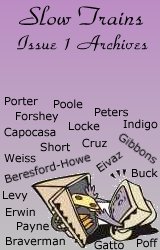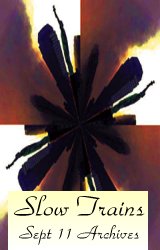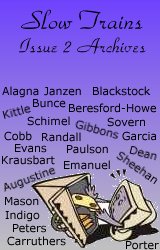All the more than normal flooding the street.
The church emptying,
cars returning
the pleased
& holy home.
When like some midnight
Cinderella, exemplified by twin girls under shy white parasols, noon's
demarcation
lets others loose: the work-weary, dirty, & staggering clean through,
checking the gutter as if it were money-strewn,
the fear-laden, gentle, skinny guy has lost
hair since the last time I saw him,
while I'm waiting for Angel
with his fixtures.
What's on my mind is not the red wine Sundays hold in store,
but the obvious fact that you haven't gotten back in touch.
Months ago you asked me to write something on
your latest paintings, a series of views out
your young son's bedroom window.
I planned to cite such precedents
as Cezanne's, Mont Sainte-Victoire, or
Hokusai's, Thirty-six Views of Fuji,
which the MFA once housed
in a room of their own.
I recall that day you showed me earlier work featuring
The Two Verlaines, the poet,
& the underground rock star.
You got that high forehead exactly right!
For my money the best two things
about Verlaine are that
Rimbaud loved
him,
& that Ambroise Vollard convinced Bonnard to illustrate the poems of
Parallement in 1900,
for which the painter chose
a labial pink for images to swim in,
& border the type without interrupting the text.
But your main concern that day was convincing us
of the worth of the series of abstractions
the views from the room
had become: of course, you lost your own father
at a young age, & now give the boy
all the attention
you missed,
to the point of imagining through his eyes the daily sequence
of light, shade, variations,
at risk of failure,
what better
endeavor?
My understanding is that we'd get together a few more times,
discuss the new work, go over
motivations, seek out
nuances.
The promised Tom Verlaine tapes never arrived
until months later, by overnight express,
along with a twelve-page hand-written letter delimiting what our dialogue
was to have accomplished,
& a deadline
to finish the piece in five days
for the printer,
& September opening.
By that time I'd taken on a new job,
headed to my brother's on the lake for the Fourth,
where I came down
with some bug going round, leaving me without a prayer
of written reply or critical insight.
I left a message on your answering machine to that extent.
It's a shame you didn't get back in touch earlier
because last night a Brokaw-like commentator announced in the dream,
"Angels have begun to inhabit the larger bells,
which seemed to have been abandoned,"
& with that, a chorus of song rang out,
orchestrating a regular Christmas
Babes in Toyland atmosphere,
or wonderfully cacophonous
Bruegel.
Waking, an infant light hoisted itself chin-high
to the window sill, then crawled into bed
next to us like a young Eros.





